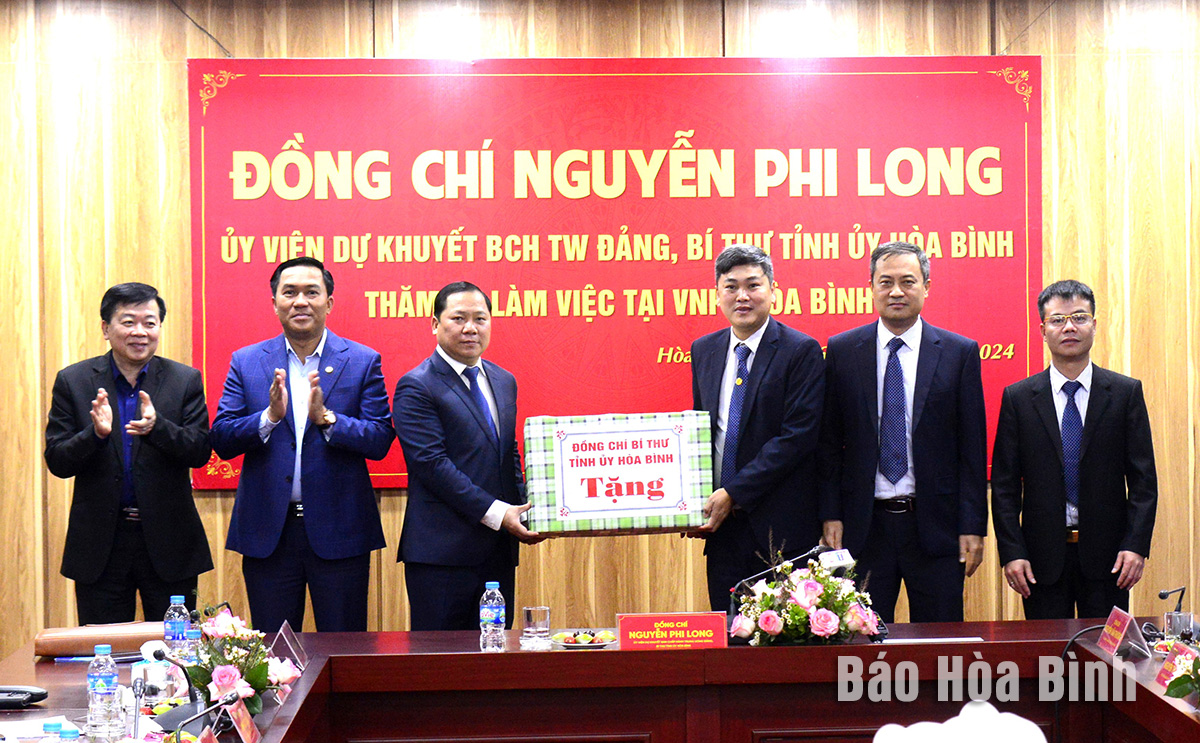
A working delegation led by Nguyen Phi Long, alternate member of the Party Central Committee and Secretary of the provincial Party Committee, paid a working visit to the Vietnam Posts and Telecommunications Group’s Hoa Binh branch (VNPT Hoa Binh) on January 16.
Nguyen Phi Long, alternate member of the Party Central Committee and Secretary of the provincial Party Committee, gives New Year gifts to VNPT Hoa Binh.
VNPT Hoa Binh continues to affirm its key role as a strong enterprise in the field of telecommunications and information technology, and as the leading unit in implementing the digital transformation programme. Last year, its revenue reached 334 billion VND (13.6 million USD), equal to 100.84% of the group's plan, and up 6.01% compared to that in 2022. It contributed 11.9 billion VND to the provincial state budget, ranking 10th out of 63 provinces and cities; and ensured stable jobs and income for 366 labourers.
In recent years, VNPT Hoa Binh has focused on expanding and renovating its network, improving customer care, optimising coverage areas, eliminating signal depressions, increasing service quality and meeting information and communication works in all situations, thus serving the direction and management of Party committees and authorities at all levels, as well as the needs of using telecoms and IT services of local people.
Acknowledging VNPT Hoa Binh’s achievements, Long emphasised its role in implementing the province's strategic breakthroughs such as infrastructure investment, administrative reform, and human resources development.
He asked the Party organisation and leaders of VNPT Hoa Binh to focus on the Party building work, well implement regulations of the Party Central Committee and the provincial Party Committee on Party development in State-owned enterprises, and pay attention to increasing the number and quality of Party members.
It is necessary to invest in infrastructure development; coordinate with the group to improve the quality of infrastructure to meet the requirements of local political tasks; complete and enhance essential services for local people to ensure all of them gain access to services; and develop digital applications, he stressed.
The Standing Board of the Hoa Binh provincial Party Committee has agreed in principle on a proposal by the Standing Board of the Party Committee of Hoa Binh city to gather feedback on the city’s 1:2000 zoning plan, which forms part of its broader urban development strategy.
Hoa Binh province has made notable progress in public administration reform and digital government development, with the satisfaction index among citizens and businesses reaching over 84%, according to recent government evaluations.
Thanks to great efforts by local authorities in recent times, the governance and public administration performance of Mai Chau district has been significantly improved.
In the afternoon of June 6, the Party Committee, the People's Council, the People's Committee and the Fatherland Front of Lac Son district solemnly held a meeting to celebrate the 139th anniversary of the district's founding (1886–2025) and the 79th anniversary of the establishment of the district's Party Committee (1946–2025). There was the attendance of Mr. Bui Van Thang, the Vice Chairman of the Provincial People's Council; Mr. Quach Tat Liem, the Vice Chairman of the Provincial People's Committee; Ms. Dang Bich Ngoc, the Deputy Head of the National Assembly Delegation of the province; as well as the former leaders of the province and district through various periods, who are the natives of the district.
Implementing the Politburo’s Resolution No. 57-NQ/TW on breakthroughs in science – technology, innovation, and digital transformation is a golden opportunity for the northern mountainous province of Hoa Binh to renew growth model, improve competitive edge and shorten digital gap.
Resolution 57-NQ/TW, issued by the Politburo on December 22, 2024, identifies sci-tech, innovation, and digital transformation as strategic breakthroughs to build a developed and prosperous nation. In Hoa Binh province, this spirit is not just a slogan, it’s being put into action through concrete initiatives that form a "new development triangle”: digital citizenship, digital economy, and digital administration.



